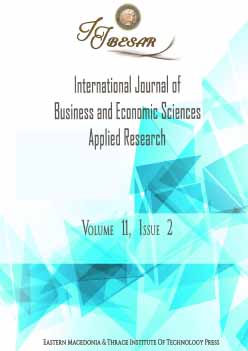Investigating the Efficiency of Senior Secondary Schools: Evidence from Schools in the Greek region of Central Macedonia
Investigating the Efficiency of Senior Secondary Schools: Evidence from Schools in the Greek region of Central Macedonia
Author(s): Dimitrios Sotiriadis, Georgios Menexes, Constantinos TsamadiasSubject(s): Economy, Education
Published by: Τεχνολογικό Εκπαιδευτικό Ίδρυμα Ανατολικής Μακεδονίας και Θράκης
Keywords: Education economics development; Higher Secondary Education; Evaluation; Efficiency;Data Envelopment Analysis;
Summary/Abstract: Purpose: This study examines the efficiency of Senior Secondary Schools, in the Region of Central Macedonia in Greece, using input-oriented Data Envelopment Analysis, with three inputs and two outputs variables. Data concern schools in urban, semi-urban/rural, for the school years 2007-08 (before the economic crisis) and 2010-11 (during the economic crisis). Design/methodology/approach: In this study, Data Envelopment Analysis is applied under the Constant Returns to Scale (CRS) or Variable Returns to Scale (VRS) hypotheses. The study used a Senior Secondary Schools sample with stratified proportional sampling. This study’s data collection has been accomplished with the help of the information systems and the databases maintained in every school. Findings: The empirical analysis revealed that the majority of schools were inefficient. The technical efficiency under constant returns to scale varies in interval [0.510-1] and [0.511-1], with average score being 0.729 and 0.827, for the school years 2007-08 and 2010-11, respectively. Under variable returns to scale varies in interval [0.521-1] and [0.516-1], with average efficiency score being 0.815 and 0.834, for the school years 2007-08 and 2010-11, respectively. The scale efficiency for 2007-08 varies in interval [0.673-1], for 2010-11 varies in interval [0.939-1], with average efficiency score being 0.897 and 0.991, respectively. During the economic crisis the performance of schools improved. Additionally, the schools in semi-urban/rural areas had on average higher efficiency than those in urban areas. Research limitations/implications: Further research can extend this study. For instance, future studies could introduce additional input and output variables. Moreover, researchers might use a combination of available techniques such as bootstrapping to estimate the efficiency of schools over a longer period of time and after the economic crisis. Originality/value: To the best of our knowledge, this is the first study of the aforementioned issue for a region on the European Union’s periphery one year before and one year during the economic crisis. The results are expected to provide insightful information for policymakers in order to better understand the performance of the schools and seek more appropriate solutions aiming at moving the sector forward. The proposal of this study is the establishment of an Observatory, authored by the Greek Ministry of Education, monitoring the diachronic data and measurements of the schools’ efficiency.
Journal: International Journal of Business and Economic Sciences Applied Research (IJBESAR)
- Issue Year: 11/2018
- Issue No: 2
- Page Range: 36-43
- Page Count: 8
- Language: English

